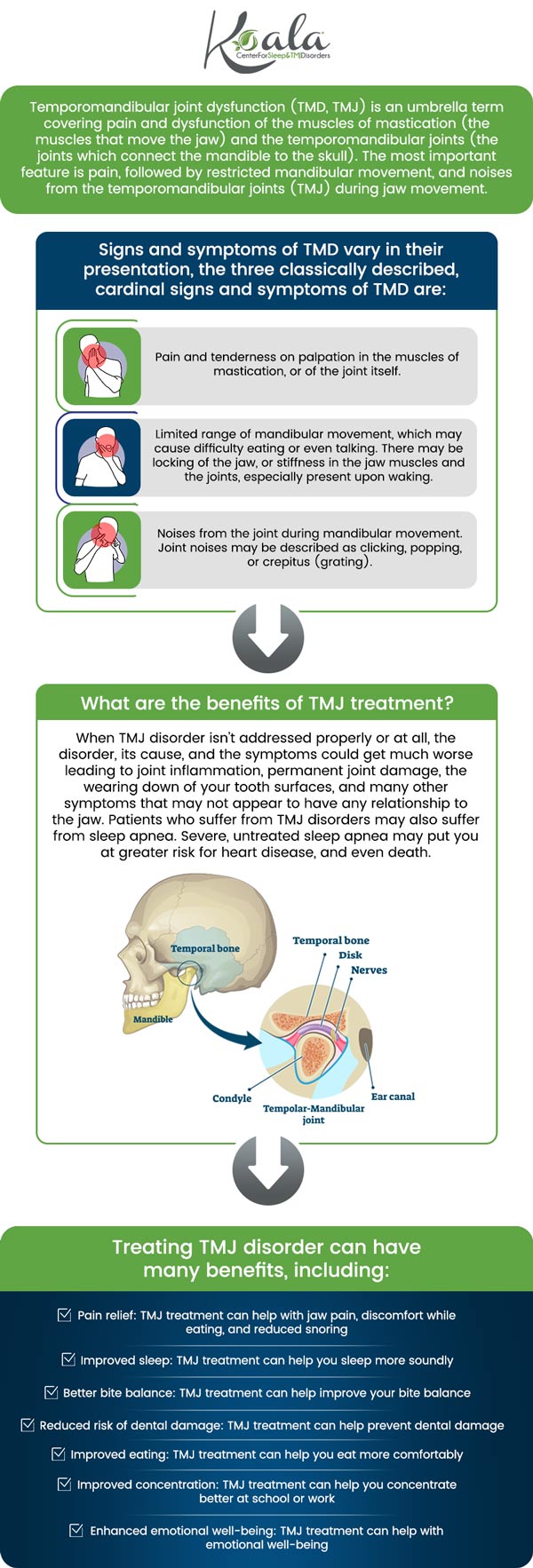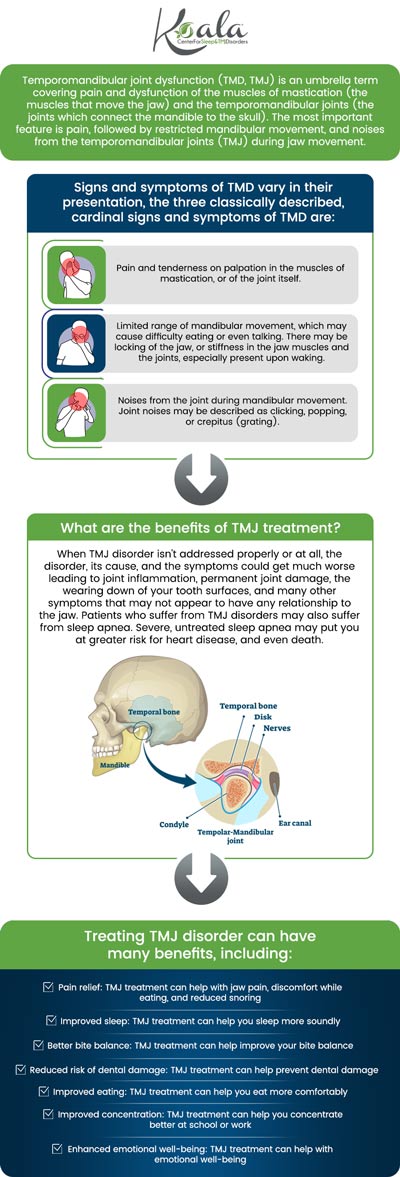How Neuromuscular Dentistry Relieves TMJ
Neuromuscular TMJ Dentist addresses the neuromuscular disorders causing headaches, jaw pain, ear and neck pain, along with teeth grinding. If you or someone you know is suffering from neuromuscular TMJ disorders, consult our professional team at Koala Center For Sleep & TMJ Disorders. For more information, please contact us today or request an appointment online. We have convenient locations in Bloomington IL, Peoria/Dunlap IL El Paso TX, and Wausau WI.




Table of Contents:
Why does my bite suddenly feel misaligned?
What are the symptoms of neuromuscular TMJ?
What is the neuromuscular treatment for the jaw?
What is the importance of neuromuscular dentistry?
If you suddenly feel your bite is misaligned, it can be frustrating and uncomfortable. There are several potential causes for this sudden shift in your bite, including:
– Teeth grinding or clenching – If you grind or clench your teeth, it can cause your teeth to shift and your bite to feel misaligned.
– Jaw issues – Issues with the temporomandibular joint (TMJ) often cause your bite to feel misaligned. This can be due to muscle tension, joint inflammation, or other factors.
– Tooth loss – If you’ve recently lost a tooth, it can cause the surrounding teeth to shift. This commonly causes a misaligned bite.
– Dental work – Sometimes, recent dental work, such as a filling or crown, can make your bite feel different than previously.
It’s critical to address any issues with your bite promptly, as a misaligned bite can lead to further dental problems and contribute to jaw pain. By seeking the help of a dental professional, you can get the treatment you need to restore your bite and improve your overall oral health.
Neuromuscular TMJ disorder causes a wide range of symptoms that can be very frustrating and impact your daily life. Some common symptoms of neuromuscular TMJ include:
– Jaw pain – Pain in the jaw joint, often accompanied by clicking or popping sounds when opening or closing the mouth, is the most common TMJ disorder symptom.
– Headaches – TMJ disorder often causes chronic headaches or migraines that are usually concentrated around the temples or forehead.
– Ear pain – Pain in or around the ears, often accompanied by ringing or fullness, can be indicative of a TMJ condition.
– Neck and shoulder pain – TMJ disorder can cause pain and tension in the neck and shoulders due to muscle strain.
– Teeth grinding – Clenching or grinding of the teeth, especially during sleep, can cause further damage to the jaw joint and surrounding muscles. Bruxism is commonly associated with TMJ disorder.
– Limited range of motion – Difficulty opening or closing the mouth fully, or feeling like the jaw is locked in place, often points to TMJ disorder.
Some common neuromuscular treatments for the jaw include:
– Bite adjustments – Neuromuscular dentists can make small adjustments to the way the teeth come together to minimize tension in the jaw and improve overall joint function.
– Orthotic therapy – Orthotics are custom-made devices worn over the teeth to stabilize the jaw and provide support for the TMJ. These devices are typically used as a temporary solution to alleviate pain and discomfort and can be adjusted as needed.
– Physical therapy – Specific exercises and stretches strengthen the muscles in the jaw and improve the mobility and flexibility of the TMJ.
– TENS therapy – TENS (Transcutaneous Electrical Nerve Stimulation) therapy involves the use of low-level electrical impulses to stimulate the muscles and nerves in the jaw and face. This treatment can effectively reduce muscle tension and improve blood flow to the area.
– Ultrasound therapy – Ultrasound therapy uses high-frequency sound waves to penetrate deep into the muscles and tissues of the jaw and face. This can minimize inflammation and promote healing in the area.
Neuromuscular dentistry is a vital aspect of dentistry as it focuses on the diagnosis and treatment of conditions related to the temporomandibular joint (TMJ). The importance of neuromuscular dentistry lies in its ability to identify and treat the root causes of TMJ disorders, rather than just treating the symptoms.
By using advanced technology, such as electromyography and sonography, neuromuscular dentists measure the activity and movements of the jaw muscles. This advanced technology allows dental professionals to identify bite imbalances and irregularities. They can then design a treatment plan that corrects the bite and restores balance to the jaw, alleviating uncomfortable symptoms.
Neuromuscular dentistry is especially important as TMJ disorders often have a significant impact on quality of life. Chronic pain and inflammation lead to difficulty eating, speaking, and sleeping. This causes a domino effect on overall health and well-being. Therefore, if you are experiencing TMJ symptoms, it is essential to promptly consult a neuromuscular dentist to prevent further complications. For more information, please contact us today or book an appointment online now.

Additional Services You May Need
▸ KoalaKIDZzz®
▸ Sleep Apnea
▸ Snoring
▸ TMJ Disorder
▸ Fatigue
▸ Sleep Disorders
▸ Weight Loss
▸ CPAP Alternative
▸ Oral Appliances




